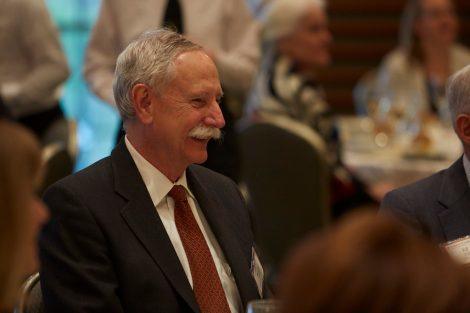May 13, 2016—In his 25 years as chair of the Department of Nutrition at Harvard T.H. Chan School of Public Health, Walter Willett, Fredrick John Stare Professor of Epidemiology, has left a significant mark on the field of nutrition. In a symposium on Monday, May 2, 2016 that drew a large crowd to the Joseph B. Martin Conference Center, more than a dozen of Willett’s colleagues and friends spoke about his legacy and highlighted his far-reaching impact.
Assessing, improving diet
Antonia Trichopolou, President of the Hellenic Health Foundation, called Willett a “committed scientist, professor and a friend” for his work that has illustrated the health benefits of the Mediterranean diet—with its focus on olive oil and other healthy fats, vegetables, whole grains, and moderate intake of healthy animal proteins. Willett’s research helped show that the Mediterranean Diet, when combined with physical activity and other healthy lifestyle choices, can prevent many cases of heart disease and diabetes. Trichopolou also praised Willett’s work showing that dietary fat is not a determinant of body fat—work that underscores the Mediterranean Diet’s focus on healthy fats. “We are lucky to have him in our corner,” said Trichopolou.
Willett has used his research to shape how restaurants prepare our food, said Greg Drescher, Vice President of Strategic Initiatives and Industry Leadership at the Culinary Institute of America (CIA). In 2013, with Willett’s help, the CIA launched Menus of Change, an initiative that urges chefs to cook food that is healthy as well as sustainable—food that includes healthy fats such as olive oil, spices from around the world, and meat used more as a condiment than a main ingredient. Menus of Change was made possible by a unique collaborative effort, said Drescher. “Scientists and public health experts, physicians and chefs, and other culinary authorities and leaders in lifestyle behavioral change, building strategy and then acting together—this is a recipe for leadership and significant social transformation,” he said.
Colleagues also noted Willett’s impact in developing valuable tools for measuring how diet affects health. Marji McCullough, Strategic Director for Nutritional Epidemiology at the American Cancer Society, said that Willett helped develop the Food Frequency Questionnaire, first used in the Nurses’ Health Study in 1980. The questionnaire lists more than 120 foods and is now used by researchers all over the world.
A collaborative researcher
Colleagues praised Willett for creating a collaborative environment that fostered important research about nutrition. As Chair of the Department of Nutrition, Willett created a place “where people care about the science and care about each other. This is unparalleled in the sciences,” said Meir Stampfer, Professor of Epidemiology and Nutrition at Harvard Chan School.
Willett’s educational impact has extended beyond the Harvard Chan School, said Mauricio Hernandez-Avila, Dean of the Mexico School of Public Health and Director General of the National Institute of Public Health in Mexico. He said that Willett has co-authored 37 papers on health in Latin America with more than 130 co-authors, and that many of those authors have gone on to conduct significant research on their own.
Sue Hankinson, Chair of the Department of Biostatistics and Epidemiology at the University of Massachusetts Amherst School of Public Health and Health Sciences and a former doctoral student at Harvard Chan School, praised Willett for always thinking comprehensively and creatively, and for being ahead of his time.
He’s also an exceptional mentor, Hankinson said. She recalled a meeting with Willett before her oral examination as a doctoral student. “I asked him how I should prepare, and he said, ‘You need to become the world’s expert in your subject,’ ” she said. She then asked him another question about her research. “The next day I went into my [oral examination], and what was the very first question he asked me? The question I asked him the day before. It really does give you the idea that Walter has very high standards, but he’s very thoughtful and kind.”
Following the symposium, colleagues and friends gathered for a reception to honor Willett.
Photo: Kent Dayton
